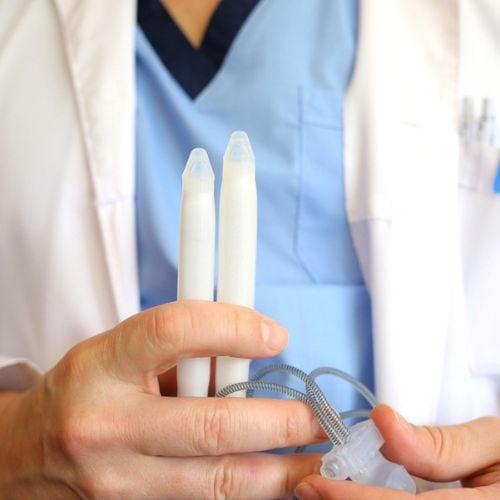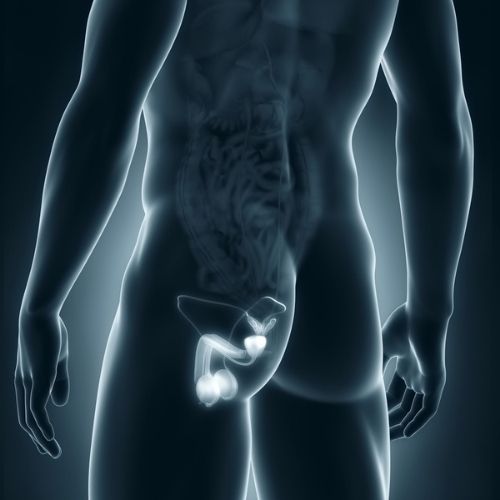What is dyspareunia?
Dyspareunia is an umbrella term that is used to describe all types of sexual pain. The pain may be felt before penetration (with arousal) while having painful intercourse (either during initial penetration or deep penetration), or even after sex.
The pain feels different to different people. It can be sharp or dull. Sometimes, it burns or stings. Other times, it aches or throbs.
The location of the pain can also be different. Some women feel pain at the opening of their vagina. Others feel discomfort at the back, front, or side of their vagina. There could be pain around the clitoris, by the labia, or deep inside the vagina. Deep pain typically affects the cervix or lower abdomen. However, pain can occur anywhere in the vulva.
The length of the pain varies. Depending on the cause, the pain can be intermittent (comes and goes) or constant.

How common is dyspareunia?
Dyspareunia is very prevalent, affecting both men and women, but is much more frequently reported by women. One in five women experiences issues with persistent painful sex. Dyspareunia affects women of all ages but happens more often after menopause or a hysterectomy.
As if having painful sex isn’t bad enough, dyspareunia can understandably cause significant emotional distress, anxiety about sex, or difficulty achieving orgasm due to fear of pain.
What are the causes of dyspareunia?
The causes of painful sex are varied and can be due to one or more factors. Here are some conditions that increase the risk of having dyspareunia:
Vaginal atrophy/dryness
In this case, the vagina is dryer than usual. Vaginal atrophy can be due to factors such as estrogen deficiency, menopause, childbirth, breastfeeding, medications, interstitial cystitis, pelvic inflammatory disease (PID), uterine fibroids, irritable bowel syndrome (IBS), radiation and chemotherapy.
Vaginal or bladder infections
The vagina or bladder is suffering from sexually transmitted infections, yeast infections, bacterial vaginosis, or urinary tract infections.
Pelvic floor dysfunction
The muscles of the pelvic floor are different than normal. They may always be tighter than usual. They may tighten up at times beyond your control. This is called vaginismus. The pelvic floor muscles and ligaments may have weakened and stretched, allowing the uterus to shift out of its normal position. As a result, the uterus sags and gets into the vagina, called uterine prolapse.
Hormonal imbalance
Your hormones may not be at the correct levels for several reasons.
Endometriosis
In this case, the type of tissue that forms the lining of the uterus grows outside the uterus.
Fibroids or ovarian cysts
Different growths can cause pain. Fibroids are growths, usually benign (non-cancerous), which develop in the wall of the uterus. Ovarian cysts are fluid-filled sacs that grow inside an ovary.
Psychological factors
Life issues such as trauma, depression, or anxiety, and relationship issues can all affect how comfortable you feel during sexual intercourse, and also affect your well-being.
Problems with nerves supplying the pelvis
Vulvodynia is the name for injuries to or irritation of your vulval nerves. Causes include diabetes or pelvic surgery.
Medications
Some medications, like birth control, can decrease sexual desire and reduce vaginal lubrication.
How do we diagnose dyspareunia?

When you visit Tower Urology, we provide accurate diagnoses. We begin by taking a detailed medical history, including a complete description of your pain. Then, we will conduct a thorough physical examination to identify any anatomical factors that may contribute to the condition.
Depending on the results, we may then conduct further investigation. For example, we might send lab tests (like a vaginal swab or urine culture), order imaging exams (if it seems the pain may be coming from abnormalities in the pelvic organs or spine), or consult with other specialties (gynecologist, pelvic floor physical therapist, pain management specialist, or sex therapist).
What are some dyspareunia treatments?
Our treatment options depend on the “why” and “where” of your pain. For example:
- If painful sexual intercourse is from vaginal dryness, then treatment with topical hormone therapy or vaginal lubricants or creams can be life-changing.
- If it is hormonally-mediated pain, then adding in topical vaginal testosterone can significantly improve your symptoms.
- If the underlying cause of your pain is coming from a vaginal or bladder infection, then appropriate antibiotics will sufficiently address it.
- If pelvic floor dysfunction is the culprit that is causing pelvic pain, then pelvic floor physical therapy can markedly improve this issue; we can also try muscle relaxers to help make physical treatment more comfortable.
- Sometimes, if the pain is due to conditions like endometriosis, uterine fibroids, or severe vestibulodynia (pain at the entrance to your vagina), then minimally invasive surgery may be the best option to relieve the situation.
Often, several different medical conditions occur simultaneously. Therefore, we tailor a combined approach to address the issues effectively.
Why is Tower Urology the best choice for treating painful sex issues in Los Angeles?
The urologists at Tower Urology are leading specialists in women’s sexual health in Los Angeles, CA. We offer expert diagnosis and treatment for many women’s health issues. With our compassionate approach and extensive experience, we are dedicated to helping women overcome this condition and enjoy a fulfilling sexual life.
Tower Urology is a proud affiliate of Cedars-Sinai Medical Center, ranked #1 in California and #2 nationwide by U.S. News & World Report. This partnership reflects our dedication to delivering the highest standard of urologic care alongside the best urologists in Los Angeles. Our years of experience and access to Cedars-Sinai’s world-class facilities ensure that our exceptional and innovative urological care positions Tower Urology as a leader in Southern California.
We invite you to establish a care plan with Tower Urology
Tower Urology’s health care professionals are conveniently located for patients throughout Southern California and the Los Angeles area, including Beverly Hills, Santa Monica, West Los Angeles, West Hollywood, Culver City, Hollywood, Venice, Marina del Rey, and Downtown Los Angeles.
Our services include treatment for clitoral adhesions/clitoral pain, vaginal dryness, painful sex, and low libido in women.
Dyspareunia FAQs
Doctors who treat dyspareunia include:
- OB-GYNs: Specialists in female reproductive health (obstetrics and gynecology).
- Pelvic Floor Therapists: Experts in pelvic muscle dysfunction.
- Sexual Health Specialists: Focus on hormonal and sexual health issues.
Treatment depends on the cause and may involve medications, lubricants, physical therapy, or counseling.
For pelvic pain in females, consult a gynecologist for reproductive health issues or acute pain. For chronic pelvic pain, seek a pelvic pain specialist. If the pain is related to other systems (e.g., gastrointestinal or urinary), you may need a gastroenterologist or urogynecologist. Start with a gynecologist or primary care physician for evaluation and referrals.
Here are key questions to ask your vaginismus doctor:
Diagnosis
- Is this vaginismus or another condition? How will it be diagnosed?
- Do I need a pelvic exam, and can it be done gently?
Symptoms
- Why am I experiencing pain during penetration? What causes this tightness or discomfort?
Treatment
- What are my treatment options (e.g., dilators, physical therapy, counseling)?
- How long does recovery take, and what is the success rate?
Support
- Can I request a smaller speculum or bring someone for support during exams?
- Should my partner be involved in treatment?
These questions will help you understand your condition and treatment plan.
































































